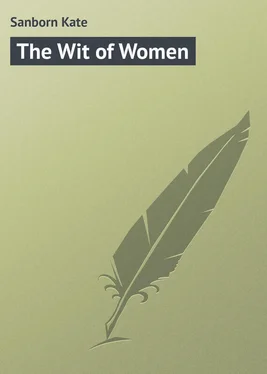Kate Sanborn Kate - The Wit of Women
Здесь есть возможность читать онлайн «Kate Sanborn Kate - The Wit of Women» — ознакомительный отрывок электронной книги совершенно бесплатно, а после прочтения отрывка купить полную версию. В некоторых случаях можно слушать аудио, скачать через торрент в формате fb2 и присутствует краткое содержание. Жанр: foreign_prose, foreign_humor, на английском языке. Описание произведения, (предисловие) а так же отзывы посетителей доступны на портале библиотеки ЛибКат.
- Название:The Wit of Women
- Автор:
- Жанр:
- Год:неизвестен
- ISBN:нет данных
- Рейтинг книги:4 / 5. Голосов: 1
-
Избранное:Добавить в избранное
- Отзывы:
-
Ваша оценка:
- 80
- 1
- 2
- 3
- 4
- 5
The Wit of Women: краткое содержание, описание и аннотация
Предлагаем к чтению аннотацию, описание, краткое содержание или предисловие (зависит от того, что написал сам автор книги «The Wit of Women»). Если вы не нашли необходимую информацию о книге — напишите в комментариях, мы постараемся отыскать её.
The Wit of Women — читать онлайн ознакомительный отрывок
Ниже представлен текст книги, разбитый по страницам. Система сохранения места последней прочитанной страницы, позволяет с удобством читать онлайн бесплатно книгу «The Wit of Women», без необходимости каждый раз заново искать на чём Вы остановились. Поставьте закладку, и сможете в любой момент перейти на страницу, на которой закончили чтение.
Интервал:
Закладка:
"Emory Ann," a creation of Mrs. Whitney's, often spoke in epigrams, as: "Good looks are a snare; especially to them that haven't got 'em." While Mrs. Walker's creed, "I believe in the total depravity of inanimate things," is more than an epigram – it is an inspiration.
Charlotte Fiske Bates, who compiled the "Cambridge Book of Poetry," and has given us a charming volume of her own verses, which no one runs any "Risk" in buying, in spite of the title of the book, has done a good deal in this direction, and is fond of giving an epigrammatic turn to a bright thought, as in the following couplet:
"Would you sketch in two words a coquette and deceiver?
Name two Irish geniuses, Lover and Lever!"
She also succeeds with the quatrain:
A signal name is this, upon my word!
Great Juno's geese saved Rome her citadel.
Another drowsy Manlius may be stirred
And the State saved, if I but cackle well.
I recall a charming jeu d'esprit from Mrs. Barrows, the beloved "Aunt Fanny," who writes equally well for children and grown folks, and whose big heart ranges from earnest philanthropy to the perpetration of exquisite nonsense.
It is but a trifle, sent with a couple of peanut-owls to a niece of Bryant's. The aged poet was greatly amused.
"When great Minerva chose the Owl,
That bird of solemn phiz,
That truly awful-looking fowl,
To represent her wis-
Dom, little recked the goddess of
The time when she would howl
To see a Peanut set on end,
And called – Minerva's Owl."
Miss Phelps has given us some sentences which convey an epigram in a keen and delicate fashion, as:
"All forms of self-pity, like Prussian blue, should be sparingly used."
"As a rule, a man can't cultivate his mustache and his talents impartially."
"As happy as a kind-hearted old lady with a funeral to go to."
"No men are so fussy about what they eat as those who think their brains the biggest part of them."
"The professor's sister, a homeless widow, of excellent Vermont intentions and high ideals in cup-cake."
And this longer extract has the same characteristics:
"You know how it is with people, Avis; some take to zoölogy, and some take to religion. That's the way it is with places. It may be the Lancers, and it may be prayer-meetings. Once I went to see my grandmother in the country, and everybody had a candy-pull; there were twenty-five candy-pulls and taffy-bakes in that town that winter. John Rose says, in the Connecticut Valley, where he came from, it was missionary barrels; and I heard of a place where it was cold coffee. In Harmouth it's improving your mind. And so," added Coy, "we run to reading-clubs, and we all go fierce, winter after winter, to see who'll get the 'severest.' There's a set outside of the faculty that descends to charades and music and inconceivably low intellectual depths; and some of our girls sneak off and get in there once in a while, like the little girl that wanted to go from heaven to hell to play Saturday afternoons, just as you and I used to do, Avis, when we dared. But I find I've got too old for that," said Coy, sadly. "When you're fairly past the college-boys, and as far along as the law students – "
"Or the theologues?" interposed Avis.
"Yes, or the theologues, or even the medical department; then there positively is nothing for it but to improve your mind."
Listen to Lavinia, one of Mrs. Rose Terry Cooke's sensible Yankee women:
"Land! if you want to know folks, just hire out to 'em. They take their wigs off afore the help, so to speak, seemingly."
"Marryin' a man ain't like settin' alongside of him nights and hearin' him talk pretty; that's the fust prayer. There's lots an' lots o' meetin' after that!"
And what an amount of sense, as well as wit, in Sam Lawson's sayings in "Old Town Folks." As this book is not to be as large as Worcester's Unabridged Dictionary, I can only give room to one.
"We don't none of us like to have our sins set in order afore us. There was David , now, he was crank as could be when he thought Nathan was a talkin' about other people's sins. Says David: 'The man that did that shall surely die.' But come to set it home and say, ' Thou art the man!' David caved right in. 'Lordy massy, bless your soul and body, Nathan!' says he, 'I don't want to die.'"
And Mrs. A.D.T. Whitney must not be forgotten. "As Emory Ann said once about thoughts: 'You can't hinder 'em any more than you can the birds that fly in the air; but you needn't let 'em light and make a nest in your hair.'"
And what a capital hit on the hypocritical apologies of conceited housekeepers is this bit from Mrs. Whicher ("Widow Bedott"): "A person that didn't know how wimmin always go on at such a place would a thought that Miss Gipson had tried to have everything the miserablest she possibly could, and that the rest on 'em never had anything to hum but what was miserabler yet."
And Marietta Holley, who has caused a tidal-wave of laughter by her "Josiah Allen's Wife" series, shall have her say.
"We, too, are posterity, though mebby we don't realize it as we ort to."
"She didn't seem to sense anything, only ruffles and such like. Her mind all seemed to be narrowed down and puckered up, just like trimmin'."
But I must have convinced the most sceptical of woman's wit in epigrammatic form, and will now return to an older generation, who claim a fair share of attention.
CHAPTER II
HUMOR OF LITERARY ENGLISHWOMEN
In reviewing the bon-mots of Stella, whom Swift pronounced the most witty woman he had ever known, it seems that we are improving. I will give but two of her sayings, which were so carefully preserved by her friend.
When she was extremely ill her physician said, "Madam, you are near the bottom of the hill, but we will endeavor to get you up again;" she answered: "Doctor, I fear I shall be out of breath before I get up to the top."
After she had been eating some sweet thing a little of it happened to stick on her lips. A gentleman told her of it, and offered to lick it off. She said: "No, sir, I thank you; I have a tongue of my own."
Compare these with the wit of George Eliot or the irony of Miss Phelps.
Some of Jane Taylor's stories and poems were formerly regarded as humorous; for instance, the "Discontented Pendulum" and the "Philosopher's Scales." They do not now raise the faintest smile.
Fanny Burney's novels were considered immensely humorous and diverting in their day. Burke complimented her on "her natural vein of humor," and another eminent critic speaks of "her sarcasm, drollery, and humor;" but it would be almost impossible to find a passage for quotation that would now satisfy on these points. Even Jane Austen's novels, which strangely retain their hold on the public taste, are tedious to those who dare to think for themselves and forget Macaulay's verdict.
Mrs. Barbauld, in her poem on "Washing Day," shows a capacity seldom exercised for seeing the humorous side of every-day miseries.
"Woe to the friend
Whose evil stars have urged him forth to claim
On such a day the hospitable rites!
Looks, blank at best, and stinted courtesy
Shall he receive. Vainly he feeds his hopes
With dinner of roast chicken, savory pie,
Or tart, or pudding; pudding he nor tart
That day shall eat; nor, though the husband try
Mending what can't be helped to kindle mirth
From cheer deficient, shall his consort's brow
Cheer up propitious; the unlucky guest
In silence dines, and early slinks away."
But her style is too stiff and stately for every day.
Читать дальшеИнтервал:
Закладка:
Похожие книги на «The Wit of Women»
Представляем Вашему вниманию похожие книги на «The Wit of Women» списком для выбора. Мы отобрали схожую по названию и смыслу литературу в надежде предоставить читателям больше вариантов отыскать новые, интересные, ещё непрочитанные произведения.
Обсуждение, отзывы о книге «The Wit of Women» и просто собственные мнения читателей. Оставьте ваши комментарии, напишите, что Вы думаете о произведении, его смысле или главных героях. Укажите что конкретно понравилось, а что нет, и почему Вы так считаете.












